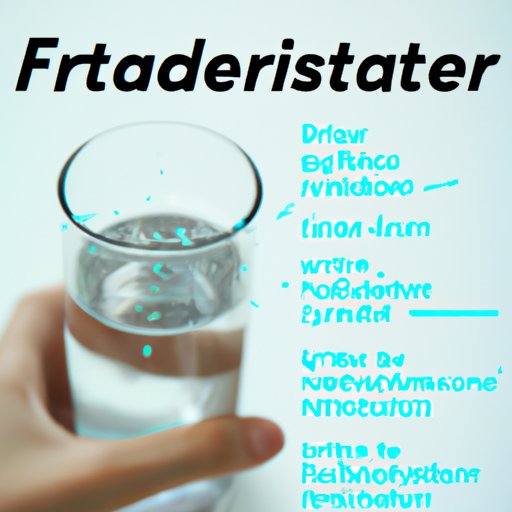
Introduction
Staying hydrated is essential for maintaining good health. Water is the key to keeping our bodies functioning properly, and it’s an essential component of many of our bodily processes. But can you be overhydrated? In this article, we’ll explore the truth about water intoxication, the importance of keeping your fluids in balance, and the dark side of hydration. We’ll also take a look at the pros and cons of water fasting, debunk myths about hydration, and offer tips on how to stay properly hydrated.
The Truth About Water Intoxication
Hyponatremia, also known as water intoxication, is a condition that occurs when there is too much fluid in the body. It’s most commonly caused by drinking too much water or other fluids too quickly, which can cause a dangerous drop in sodium levels in the blood. The risks associated with overhydration include seizures, brain swelling, and even death.
Some of the signs and symptoms of water intoxication include headaches, nausea, vomiting, confusion, seizures, and even coma. This condition can be life-threatening, so it’s important to be aware of the risks and to take measures to avoid overhydration.
Keeping Your Fluids in Balance
It’s important to stay hydrated, but it’s equally important to do so in a smart way. One of the best ways to stay properly hydrated is to drink water throughout the day, rather than all at once. This helps to keep your fluids in balance and prevents the risks associated with overhydration.
Other tips for staying hydrated include drinking water before and after exercise, avoiding sugary drinks and caffeine, and paying attention to your thirst levels. It’s also important to keep in mind that you may need more water depending on your activity level, the time of year, and other factors.
The Dark Side of Hydration
While staying hydrated is important, drinking too much water can have negative effects on the body. Excessive water intake can lead to dilution of important minerals and electrolytes, which can cause health problems. In severe cases, overhydration can lead to water intoxication, which can be life-threatening.
The risks associated with excessive water intake include water intoxication, decreased kidney function, and swelling of the brain. It’s important to be aware of these risks and to take measures to prevent overhydration.
Going Too Far: When Your Water Consumption Becomes Excessive
Excessive water consumption can sometimes be a sign of psychological or behavioral issues. Some people may drink excessive amounts of water as a way to cope with stress or anxiety, while others may have an obsessive need to stay hydrated. It’s important to recognize when your water consumption becomes excessive and to seek help if necessary.
Strategies for addressing excessive water consumption may include therapy, counseling, or other behavioral interventions. It’s important to get to the root of the problem and to find healthy, sustainable ways to cope with stress and anxiety.
The Pros and Cons of Water Fasting
Water fasting has become a popular trend in recent years, with many people touting its purported health benefits. The idea behind water fasting is to deprive the body of solid foods and to consume only water for a period of time. While there are some potential benefits to water fasting, there are also risks to consider.
Some of the potential benefits of water fasting include weight loss, improved insulin sensitivity, and improved immune function. However, there are also risks associated with water fasting, including nutrient deficiencies, dehydration, and electrolyte imbalances.
Debunking Myths About Hydration
There are many myths and beliefs about hydration, and it’s important to separate fact from fiction. Some common misconceptions include the idea that you need to drink eight glasses of water a day, that thirst is not a reliable indicator of hydration, and that all fluids are created equal.
The truth is that there is no one-size-fits-all answer to how much water you should drink each day. Your water needs will vary depending on your activity level, your body size, and other factors. Thirst is generally a reliable indicator of hydration, and it’s important to choose fluids that contain important nutrients and electrolytes.
Conclusion
Staying hydrated is important, but it’s equally important to do so in a smart and balanced way. Overhydration can be dangerous, so it’s important to be aware of the risks and to take measures to prevent it. By staying informed and paying attention to your body’s signals, you can ensure that you stay healthy and hydrated.




